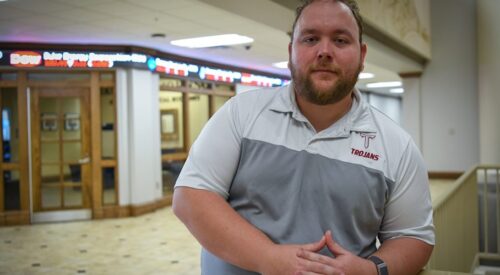
4.16.25 – Troy University -Clif Lusk
A Sorrell College of Business professor’s research into state licensing regulations has led him to the Texas Legislature.
Dr. Noah Trudeau, an assistant professor of Decision Systems and Sciences, was called on to provide expert testimony on several licensure measures – most notably one sponsored by former Speaker of the House of Representatives Dade Phelan.
His testimony is an outcropping of research in and the development of the State Occupational Licensing Index – SOLI, for short – under the Archbridge Institute. The SOLI is a tool that assesses extent and impact of occupational licensing requirements in each state and ranks the states according to occupational licensing burden. In 2024, 284 occupations were examined. Across the United States, occupational licensing affects more than 20 percent of all workers.

“It’s Texas. You would think there are very free markets in Texas compared to the perceived highly regulated states such as New York or California,” he said. “In reality, Texas has the highest barriers and licensing burdens of any state in the nation.”
Texas is joined by Arkansas, Tennessee, Oregon and Alabama in the Top 5 for 2024, while Kansas had the lowest burden.
Traditionally, Trudeau said that burden had been looked at only in terms of impact to low-income occupations. SOLI considers occupations across all incomes and attempts to provide the most comprehensive picture of occupational licensing in the United States.
Last August, the Coalition for Regulatory Efficiency and Reform, a Texas-based group concerned about economic prosperity issues, asked Trudeau to explain the SOLI findings. That discussion led to the call to testify before legislative leaders, specifically on Phelan’s HB 11 dealing with reciprocity of licensing.
What it comes down to, Trudeau said, is a question of economic freedom, state restriction of supply and limiting mobility.
“Texas has the highest immigration of any state. People are moving to Texas for a variety of reasons, but there are roadblocks erected by the state that make it hard for, say an electrician or a plumber, to move from one state into Texas and continue the trade,” he said.
HB 11 would direct the Texas Department of Licensing and Regulation to seek out reciprocal agreements with other states, and to report any “Texas red tape” hindering the transfer of licensing from other states.
“Texas needs to lower the cost, provide more access and decrease wait times for licensure, and reduce limits on mobility,” he said. “If Texas licenses were more easily obtained, even more people might move to the state.”
Such a move isn’t unprecedented. In 2023, Virginia enacted universal licensure acceptance as an incentive for economic development recruitment, and just this year, North Dakota and West Virginia followed suit.
“So many states have licensure requirements that can be overly burdensome, and SOLI can give legislators a dose of reality when it comes to the impact of restrictive licensure in today’s economy,” he said.

Author
Clif Lusk
Clif Lusk is a University Relations Coordinator at Troy University.
